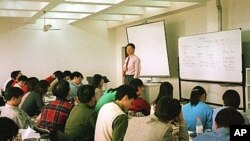European markets have surged ahead to two-month highs after strong manufacturing data from China. The country's economy is growing at 9 percent per year, and though that's predicted to slow slightly in 2012, its continued success will be in marked contrast to Europe. Many European economies are forecast to return to recession this year. Perhaps it's not surprising, then, that an increasing number of graduates from European universities are applying for internships in Chinese companies.
Until now, the closest that Alexander Lerner has ever been to China is a restaurant in London’s Chinatown. He’s a graduate from law school, but is finding it very hard to secure a job.
“It’s very tough, it’s not just getting the training contract but once you are there as well, the internal competition is extremely intense," Lerner explained.
One in five 16 - 25-year-olds in the UK can’t find a job. In Spain, the figure is two in five. But Alexander has a plan to get ahead of the competition. In a few days time he’s heading to China for several weeks to work in a firm there.
“There’s no way that you couldn’t stand out from the crowd having done something like that because it’s not on everyone’s CV. I’ve worked in a Shanghai law firm practicing Chinese law with a Confucian basis that can’t not be a talking point really," Lerner noted.
Sitting beside Alexander is Kay Michael, a UK boss of CRCC Asia, the company organizing Alexander’s trip.
"We’ve got a lot of people coming in from Ireland, Spain Italy, economies in Europe that aren’t doing so well," she said.
They have seen the number of European graduates apply for their Chinese internship programs double every year since 2008. And the graduates that do go, even if just for a month, don’t always come back.
“A lot of them come on to our program with the idea of staying out in China after the internship.. A lot of them use this as a stepping stone to break into the Chinese market; 30 percent of them get offered full time jobs after their internships,” Michael stated.
It’s not surprising that so many graduates like Alexander are looking to China for help. Despite the continued economic fragility in the West, China is still growing at a fast clip of 9 percent year on year.
Recent figures show that factory output expanded between November and December. In years gone by it almost exclusively relied on exports to fuel growth. Now its traditional customers in the West are weak, it’s turned to its own people, who are starting to consume more of its own goods and services.
At London’s Heathrow airport, I’m meeting Haady Sherif, who works for the firm that runs it. He went on an internship to China in 2010. He found the food a bit unusual, but says it changed his life for the better.
“My internship in China was definitely an epiphany for me and opened doors for me. On your CV it gives you that extra bolster. It excels your CV. It shows that you are willing, you are eager, and I would recommend it to any graduate," Sherif said. "Get out there, get the experience. Meet the people, network, and witness a different culture really.”
The U.S. investment bank Goldman Sachs thinks China’s stellar growth rates will stay almost unscathed this year. It’s widely forecast that many economies in Europe will go back into recession in 2012. As a fifth year of economic stagnation beckons, thousands more graduates are sure to jet off to find a better offer around the globe.
European Grads Target China Job Market for Employment









